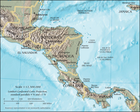Introduction
Republic of Costa Rica República de Costa Rica (Spanish) | |
|---|---|
| Anthem: "Himno Nacional de Costa Rica" (Spanish) "National Anthem of Costa Rica" | |
| ISO 3166 code | CR |
Costa Rica (UK: /ˌkɒstə ˈriːkə/, US: /ˌkoʊstə-/ ⓘ; Spanish: [ˈkosta ˈrika]; literally "Rich Coast"), officially the Republic of Costa Rica, is a country in the Central American region of North America. Costa Rica is bordered by Nicaragua to the north, the Caribbean Sea to the northeast, Panama to the southeast, and the Pacific Ocean to the southwest, as well as maritime border with Ecuador to the south of Cocos Island. It has a population of around five million0 in a land area of 51,060 km2 (19,710 sq mi). An estimated 333,980 people live in the capital and largest city, San José, with around two million people in the surrounding metropolitan area.
The sovereign state is a unitary presidential constitutional republic. It has a long-standing and stable democracy and a highly educated workforce. The country spends roughly 6.9% of its budget (2016) on education, compared to a global average of 4.4%. Its economy, once heavily dependent on agriculture, has diversified to include sectors such as finance, corporate services for foreign companies, pharmaceuticals, and ecotourism. Many foreign manufacturing and services companies operate in Costa Rica's Free Trade Zones (FTZ) where they benefit from investment and tax incentives.
Costa Rica was inhabited by indigenous peoples before coming under Spanish rule in the 16th century. It remained a peripheral colony of the empire until independence as part of the First Mexican Empire, followed by membership in the Federal Republic of Central America, from which it formally declared independence in 1847. Following the brief Costa Rican Civil War in 1948, it permanently abolished its army in 1949, becoming one of only a few sovereign nations without a standing army. (Full article...)
The Costa Rica Quiz
![]() True or false: voting is mandatory in Costa Rica.
True or false: voting is mandatory in Costa Rica.
Selected article -

Limón (Spanish pronunciation: [liˈmon]), commonly known as Puerto Limón (Port Lemon in English), is a district, the capital city and main hub of Limón Province, as well as of the Limón canton in Costa Rica. It is the seventh largest city in Costa Rica, with a population of over , and is home to the Afro-Costa Rican community. Part of the community traces its roots to Italian, Jamaican and Chinese laborers who worked on a late nineteenth-century railroad project that connected San José to Puerto Limón. Until 1948, the Costa Rican government did not recognize Afro-Caribbean people as citizens and restricted their movement outside Limón province. As a result of this travel ban, this Afro-Caribbean population became firmly established in the region, which influenced decisions not to move even after it was legally permitted. Nowadays, there is a significant outflow of Limón natives who move to the country's Central Valley in search of better employment and education. The Afro-Caribbean community speaks Spanish and Limonese Creole, a creole of English.
Puerto Limón contains three port terminals, Moín Container Terminal, Port of Limón and Port of Moín, which permit the shipment of Costa Rican exports as well as the anchoring of cruise ships. In 2016, the government pledged ₡93 million ($166,000) for a new cruise ship terminal for Puerto Limón. (Full article...)Did you know (auto-generated)

- ... that goalkeeper Daniela Solera had the most touches of any Costa Rican player in their opening match of the 2023 World Cup?
- ... that while Pedro Joaquín Chamorro Barrios was exiled from Nicaragua and living in Costa Rica in the 1980s, his sister Claudia was there as Nicaragua’s ambassador?
- ... that in August 2021 Sheika Scott became the youngest player to score in the Costa Rican Women's Premier Division, at just 14 years old?
- ... that Marita Camacho Quirós, who was First Lady of Costa Rica (1962–1966), is the oldest former first lady in the world and a supercentenarian?
- ... that footballer Alexandra Pinell scored the Costa Rica U20 team's only goal at the FIFA tournament hosted by their country?
- ... that to animate conquistadors in Jungle Cruise, frogs were recorded in a Costa Rican forest?
More Did you know -
...that the Irazú Volcano in Costa Rica erupted violently in 1963, on the day U.S. President John F. Kennedy arrived in the country?
Related portals
Selected image -
Costa Rica news
No recent news
WikiProjects
History
Geography and environment
Politics and government
UNESCO World Heritage Sites
Economy and society
 |
Economics
|
 |
National Identity
|
Things you can do

Here are some things you can do for WikiProject Costa Rica:
- Create requested articles:
- Expand "stub" and "start" articles:
- Assess the importance of articles:
Associated Wikimedia
The following Wikimedia Foundation sister projects provide more on this subject:
-
Commons
Free media repository -
Wikibooks
Free textbooks and manuals -
Wikidata
Free knowledge base -
Wikinews
Free-content news -
Wikiquote
Collection of quotations -
Wikisource
Free-content library -
Wikiversity
Free learning tools -
Wikivoyage
Free travel guide -
Wiktionary
Dictionary and thesaurus
External media
- News
- The Costa Rica Star – Costa Rica news
- The Tico Times
- Q Costa Rica
References
- ^ "Biodiversity in Costa Rica". Archived from the original on 2011-11-18. Retrieved 2007-04-18.
- ^ "Compulsory Voting". Internateal IDEA. Retrieved 9 Dec 2023.
- ^ State-sponsored Homophobia A world survey of laws prohibiting same sex activity between consenting adults[dead link] Archived 17 October 2012 at the Wayback Machine
- ^ Trejos, Alonso (1991). Geografía Ilustrada Costa Rica (in Spanish). San José, Costa Rica: Trejos Editores. p. 128. ISBN 9977-54-029-2.


















































































